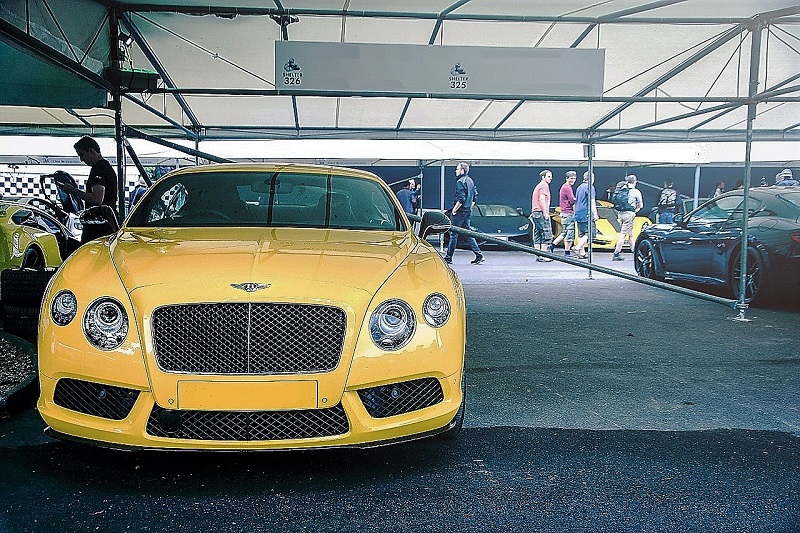It can be a little daunting when you think of buying at auction, but these are the places where car dealers get the bulk of their stock, so prices are usually much cheaper. There are pros and cons though, so it’s best to be prepared with these eight essential tips.

1. Research
The first step is to locate a public car auction near you. By going to their website, not only are you able to scroll through the stock coming up for sale, you also have the chance to find out the opening hours for viewing cars, and read through their terms and conditions of sale. They should also list the fees or percentages they charge once the hammer goes down. If it isn’t clear or they don’t list in full their cost structure, you will need to call them or ask in person. Once you have looked over what available stock there is, or even if there is a particular make and model you already have in mind, look at several used car websites to get a general feeling of actual price sellers are wanting for the make and model you’re after. Ask a mechanic what cars are the most reliable so you can narrow your list down. In my experience the price at auction of the same car is roughly 33% cheaper overall – and by overall, I mean after you have registered the car and made sure it’s roadworthy (so you could pick up a $9,000 car for $6,000 – but prices vary on desirability and condition).
2. Advice
Ask around and see if anyone you, your family or friends know has been to a car auction so you can pick their brains for tips. Don’t purchase the very first week you decide you are going to buy at auction. You need to do lots of research and get a feel for the auction house and the process before being confident enough to put in a bid. Take a friend, mechanic, or family member with you for moral support and to make sure you don’t get carried away bidding more than you budgeted. Decide where you want to stand (towards the back can be a good tactic as you can see who is bidding in front of you without turning around and making others known of your intent). If you are the successful bidder, you will need to work out how to remove the car (as most cars will be un-roadworthy). So prepare beforehand by researching and selecting a popular towing company with great reviews and have their contact details at the ready.

3. Visit
The natural progression here is to go in and experience the environment, the layout, the order of things, the sign-up process etc. Don’t go on the day of the auction to find out information and ask questions as the staff will be too busy and the place will be packed with bidders looking over cars and getting in your way. It is important to allow yourself a couple of hours to go round the cars on offer as there will be hundreds, possibly thousands depending where you live. Once you’re there in person, you will possibly see many other cars that attract your attention that you didn’t notice online. Once you feel more comfortable and want to go to a live auction or two, take a friend so you can check out who looks like a dealer and what prices they are bidding up to. This also applies even if you are thinking of bidding remotely from your computer or other device, so you get an understanding of what goes on at the actual auction you will be part of. You may have to go a few times to get a real feel for the action on the day. On the day, be sure to take your driver’s license, or photo ID and proof of address, and preferred payment method.
4. Inspect
ESSENTIAL!!!!!! Bidding blindly on a car you haven’t seen can cost you dearly. Photos don’t show the whole picture as they often don’t capture hail damage or indentations in certain light, don’t show the condition of the carpet, roof lining, or under the car. You never see photos of any leaks around the engine bay, hidden rust spots, cracks in the headlights, taillights, or windscreen, or even bad wiring. Even if you can’t find a mechanic or someone with mechanical knowledge to go with, make sure you do as much as you can. You can check out an extensive checklist on what to look for on http://rearviewreview.com/essential-tips-for-inspecting-a-used-car/

5. Question
Ask the auction house if the cars have been checked and confirmed as not stolen, and ask for full-mileage, service history, or any manuals and extra keys if there are any on the vehicle you’re interested in. The auction houses I’ve attended keep all this stuff behind the counter so it doesn’t get stolen. Manuals perhaps aren’t as important as you can easily get this information online or even search for old-school hard copies to purchase.
6. Limits
You need to be precise when it comes to price as there are a lot of factors to consider. Probably best to make a list or spreadsheet of possible costs it will take to get the car of your dreams at auction, and to get on the road. Cars at auction DON’T come a warranty and most don’t offer a ‘test-drive’. So, prepare for extra costs (such as replacing tires or a cracked windscreen). Your thorough inspection of the car beforehand should have given you some ideas on possible costs here. Look online or ask your local or family mechanic how much any issues you know of will cost to repair. Make sure to factor in credit card fees (usually 3%), and percentage charges (the ‘Buyer’s Premium’) the auction house will take. You may also want to factor in any towing costs of getting the car delivered to your home.

7. Bidding
Car auctions tend to go fast as there are a lot to get through, so you will need your wits about you to listen to the auctioneer. Grab an auction catalogue so you know when the car you’re interested in will come through. If you prefer to bid online in the comfort of your own home, ensure all requirements have been filled out earlier, and you have made sure you can access the auction live by testing it out on previous auctions. Don’t be first kid off the block. Wait for the bidding to get underway, and only start bidding when most bidders are out (and the final warnings are given that the car will be sold) provided it’s within your budget. Stick to your guns. Don’t get swept up in the moment and overspend. If the car you want has sold to another bidder, just move onto the next one. There are always going to be more cars available – even the one you want, it just may take a little longer – and if you had more than one you were interested in, you have more chances of getting one at the same auction. If the hammer falls on your bid, then you’ve been successful in purchasing the car – awesome – Well Done!
8. Next
Once you’ve won the bid, you’ll need to see the auction clerk who will usually sit or stand next to the auctioneer for confirmation of details. From here, you can go and pay at the accounts counter. If your bid was the highest but didn’t reach the reserve price (this is called a ‘Provisional Bid’), the auction house staff will liaise with the seller to see if your bid will be accepted, or if there is some negotiation which is acceptable to both parties. Once the sale has been completed, you are free to take the car (whether drive it off the lot, or arrange for transport).
Auctions can be exciting and a great experience, just remember to have your wits about you and the confidence to bid soundly. Good luck!


[…] specific ex-fleet auction. A lot of them do inspection reports and go for cheaper prices. Check out https://rearviewreview.com/essential-tips-for-buying-at-auction/ for more detailed information. Have fun hunting for your next […]